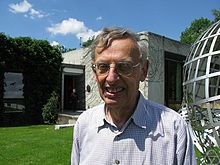E. M. Stein
| Elias M. Stein | |
|---|---|
 |
|
| Born |
January 13, 1931 Antwerp, Belgium |
| Nationality | American |
| Alma mater | University of Chicago (Ph.D., 1955) |
| Known for | Stein–Strömberg theorem |
| Spouse(s) | Elly Intrator |
| Children | Karen Stein Jeremy C. Stein |
| Awards |
Rolf Schock Prize in Mathematics (1993) Wolf Prize in Mathematics (1999) National Medal of Science (2001) Leroy P. Steele Prize (2002) |
| Scientific career | |
| Fields | Mathematics |
| Institutions | Princeton University |
| Thesis | Linear Operators on LpSpaces (1955) |
| Doctoral advisor | Antoni Zygmund |
| Doctoral students |
Charles Fefferman Christopher D. Sogge Robert Strichartz Terence Tao Gregg Zuckerman Steven G. Krantz William E. Beckner David Jerison Sundaram Thangavelu |
Elias Menachem Stein (born January 13, 1931) is a mathematician. He is a leading figure in the field of harmonic analysis. He is a professor emeritus of Mathematics at Princeton University.
Stein was born to Elkan Stein and Chana Goldman, Ashkenazi Jews from Belgium. After the German invasion in 1940, the Stein family fled to the United States, first arriving in New York City. He graduated from Stuyvesant High School in 1949, where he was classmates with future Fields Medalist Paul Cohen, before moving on to the University of Chicago for college. In 1955, Stein earned a Ph.D. from the University of Chicago under the direction of Antoni Zygmund. He began teaching in MIT in 1955, moved to the University of Chicago in 1958 as an assistant professor, and in 1963 became a full professor at Princeton, the position he currently holds.
Stein has worked primarily in the field of harmonic analysis, and has made contributions in both extending and clarifying Calderón–Zygmund theory. These include Stein interpolation (a variable-parameter version of complex interpolation), the Stein maximal principle (showing that under many circumstances, almost everywhere convergence is equivalent to the boundedness of a maximal function), Stein complementary series representations, Nikishin–Pisier–Stein factorization in operator theory, the Tomas–Stein restriction theorem in Fourier analysis, the Kunze–Stein phenomenon in convolution on semisimple groups, the Cotlar–Stein lemma concerning the sum of almost orthogonal operators, and the Fefferman–Stein theory of the Hardy space and the space of functions of bounded mean oscillation.
...
Wikipedia


